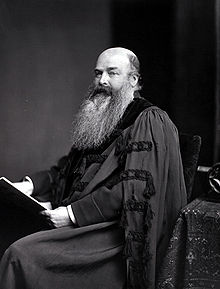Thomas Anderson (chemist)
Thomas Anderson (born July 2, 1819 in Leith , Scotland , † November 2, 1874 in Chiswick ) was a Scottish chemist and medicin .
Life
Anderson studied medicine at Edinburgh University and received his doctorate there in 1841 . In the following years he began extensive studies in organic chemistry in Sweden , Germany and Austria and took up a teaching position on his return to Scotland . In 1852 he received the Regius Professorship of Chemistry at the University of Glasgow as the successor to Thomas Thomson (1772-1852). Since 1845 he was a Fellow of the Royal Society of Edinburgh .
In addition to teaching, Anderson was editor of the Edinburgh New Philosophical Journal and published articles on selected research topics. In 1859 he became chairman of the Glasgow Philosophical Society and in 1867 chairman of the chemical department of the British Association for the Advancement of Science . In recognition of his research achievements, Anderson was awarded the Royal Medal for Chemistry in 1872 . Bases in Dippel's animal oil . This mainly concerned his research results on codeine , the crystallized components of opium as well as on piperine and papaverine and his research on physiological and animal chemistry. A neurological disease, which could have been syphilis , repeatedly forced him to take longer periods of recovery in the years that followed. As the disease progressed, he had to give up his teaching post in 1874. He was succeeded by John Ferguson (1838-1916). Anderson died in Chiswick late that year .
plant
Anderson discovered a number of organic compounds that he often extracted or distilled from animal material. These include numerous heterocyclic bases as well as alkaloids , such as pyridine or picolines , which he had obtained by dry distillation from bone oil , which is formed when dry bones are strongly heated.
“The first of these bases, which I want to call pyridine, is contained in the portion that passes over at about 115 ° C. This portion has a very similar smell to that of picolin, but is even stronger and more pungent. It is completely transparent and colorless and does not change color in contact with the air. It is in every proportion in water and easily soluble in volatile and non-volatile oils. In concentrated acids it dissolves under intense heat development, and forms very easily soluble salts with them. "
Important writings
- Elements of Agricultural Chemistry, 1860
Individual evidence
- ^ The University of Glasgow Story Thomas Anderson ; from the University of Glasgow website, accessed January 20, 2015.
- ↑ shaper RSE Fellows 1783-2002. Royal Society of Edinburgh, accessed October 5, 2019 .
- ↑ Th. Anderson: The crystalline constituents of opium , in: Transactions of the Royal Society of Edinburgh 1853 , 20 , 347-75.
- ^ Biography, University of Glasgow
- ^ GF Rodwell: Anderson, Thomas (1819–1874) , Oxford Dictionary of National Biography, Oxford University Press, 2004.
- ↑ Th. Anderson: Products of the dry distillation of animal matter , in: Liebigs Ann. 1849 , 70 , 32-38; doi : 10.1002 / jlac.18490700105 .
- ↑ a b Th. Anderson: About the products of the dry distillation of animal matter , in: Liebigs Ann. 1851 , 80 , 44-65; doi : 10.1002 / jlac.18510800104 .
- ↑ Th. Anderson: About the products of the dry distillation of animal matter , in: Liebigs Ann. 1855 , 94 , 358-365; doi : 10.1002 / jlac.18550940312 .
| personal data | |
|---|---|
| SURNAME | Anderson, Thomas |
| BRIEF DESCRIPTION | Scottish chemist |
| DATE OF BIRTH | July 2, 1819 |
| PLACE OF BIRTH | Leith (Scotland) |
| DATE OF DEATH | November 2, 1874 |
| Place of death | Chiswick |
